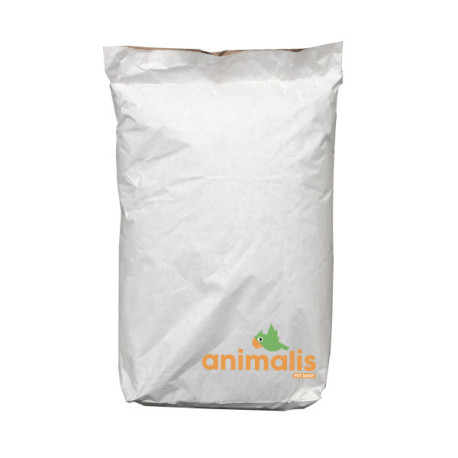





Reference: 103065200
Yellow millet is rich in vitamins and minerals and is an alkaline (non-acidic) cereal. It is part of the basic diet of parakeets, exotic birds and exotic doves.
Millet contains magnesium, phosphorus, iron, potassium, manganese, vitamin A, vitamin B1, vitamin B2, vitamin PP (nicotinic acid) and vitamin B5.
Yellow millet is rich in vitamins and minerals and is an alkaline (non-acidic) cereal. It is part of the basic diet of parakeets, exotic birds and exotic doves.
Millet contains magnesium, phosphorus, iron, potassium, manganese, vitamin A, vitamin B1, vitamin B2, vitamin PP (nicotinic acid) and vitamin B5.
Dimensions: 20kg
Aleppo pine seeds (large) for parakeets, parrots, crossbills... is a natural pine seed, a delight for your birds, this seed also has therapeutic virtues, it can be added to the seed mixture or in a separate feeder.
Chenopodium quinoa is an annual plant, one to two meters tall or more. The central stem is cylindrical at the collar and becomes more angular higher. It can be unique or have many ramifications, with a diameter ranging from one to eight centimeters and a height of 0.5 to 3 m, depending on the varieties and growing conditions such as seeding density or fertilization9. Its color is also very variable: uniformly green, green with purple or red streaks, or uniformly red.
Birds like to remove the shells from peanuts and then eat the peanuts. Peanuts are a source of energy, which is very important for the long winter months.
Unpeeled peanuts can be given to parrots as a treat.
Soybeans are an excellent source of iron, zinc, manganese, copper, selenium, potassium, vitamins, fiber, polyunsaturated fatty acids and antioxidants, in short, it is an excellent dietary supplement.
Soybeans are often used in sprouting seed mixes.
Thanks to its small black or pretty electric blue seeds, the poppy is recognizable among thousands. A cousin of the poppy, the poppy is known for its content of good fats and micronutrients essential for the proper functioning of the body.
Improves liver and overall health of birds.
Suitable for a wide range of birds, including parrots, canaries, budgerigars, and other exotic birds.
Benefits for birds:
- Liver support.
- Detoxification: Helps eliminate toxins from the liver and improves digestion.
- Strengthening the immune system.
Instructions for use:
Dosage: Add a small amount (usually a teaspoon per day) to the birds' usual seeds. The amount may vary depending on the size and specific needs of the birds. Can be mixed with the birds' daily food.
Precautions:
Store in a cool, dry place, away from moisture and direct sunlight.
The shuttle is almost similar to rapeseed, the difference lies in the bitter flavor of the latter. The shuttle seed is rich in protein and favorable to the improvement of song, so it is interesting during the breeding season in canaries. However, as this seed is quite fatty, we advise you not to exceed 10% of your shuttle mixture for colored canaries or posture canaries. For singing canaries, the shuttle softens the song and can therefore be used at 30% of the mixture: in the latter case, we advise you to accompany your bird's diet with liver support.
Striated sunflower is the basic seed of any parrot mixture. It is also used in mixtures for parakeets and exotic doves.
It is also the favorite food of your outdoor birds during the winter period! Ideal for feeding the birds in your garden.
Practical information for giving sunflower seeds to birds in your garden:
Remember to regularly clean the feeders of your outdoor birds so that diseases and bacteria do not thrive.
Also consider setting feeders high up to prevent predators (such as cats, foxes, etc.) from targeting birds when they are eating.
Hemp seeds are very nutritious and contain more essential fatty acids (EFAs) than any other source, and are second only to soybeans in their richness in highly digestible proteins of high biological value. They are particularly recommended during breeding periods to stimulate the reproductive instinct of birds.
Clover stimulates the immune system and slows down cellular ageing through its excellent antioxidant properties. Rich in vitamins B, C, E and provitamin A.
Flaxseed is rich in omega 3, which is essential for the cardiovascular system.
A 100% natural product that is mixed with breeding or with food; It doubles in size by adding water.
Carrots are very rich in vitamins with a high proportion of vitamin A and carotene, as well as vitamin B, calcium and valuable carbohydrates.

Yellow millet is rich in vitamins and minerals and is an alkaline (non-acidic) cereal. It is part of the basic diet of parakeets, exotic birds and exotic doves.
Millet contains magnesium, phosphorus, iron, potassium, manganese, vitamin A, vitamin B1, vitamin B2, vitamin PP (nicotinic acid) and vitamin B5.
